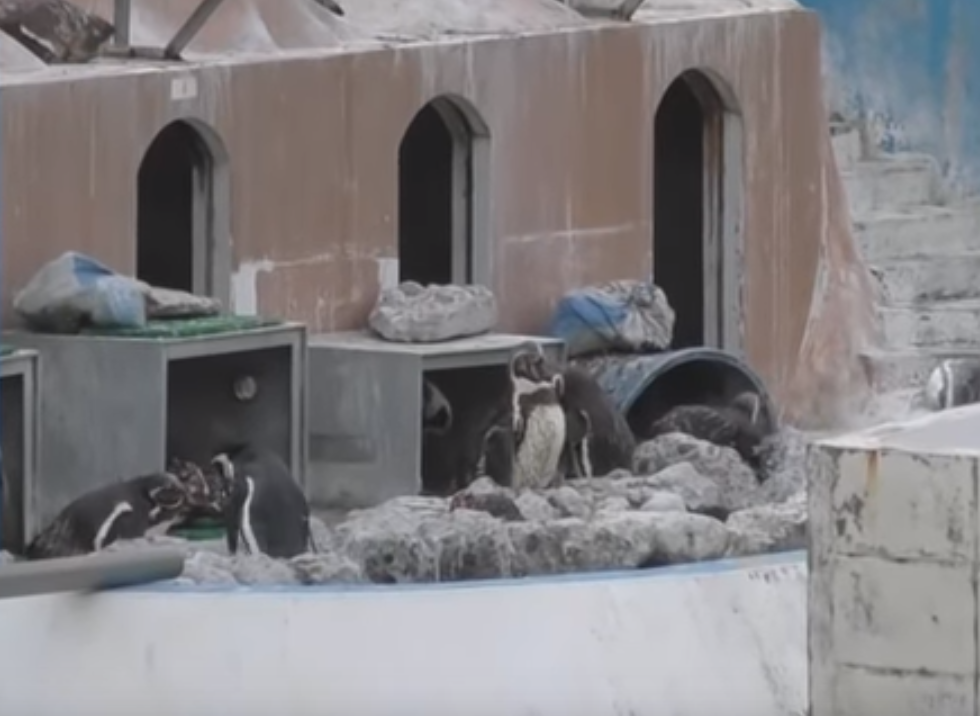Dolphin and dozens of penguins left abandoned in derelict Japanese aquarium
'As a group that handles animals, they have a responsibility to explain what they intend to do,' activist group says

Your support helps us to tell the story
From reproductive rights to climate change to Big Tech, The Independent is on the ground when the story is developing. Whether it's investigating the financials of Elon Musk's pro-Trump PAC or producing our latest documentary, 'The A Word', which shines a light on the American women fighting for reproductive rights, we know how important it is to parse out the facts from the messaging.
At such a critical moment in US history, we need reporters on the ground. Your donation allows us to keep sending journalists to speak to both sides of the story.
The Independent is trusted by Americans across the entire political spectrum. And unlike many other quality news outlets, we choose not to lock Americans out of our reporting and analysis with paywalls. We believe quality journalism should be available to everyone, paid for by those who can afford it.
Your support makes all the difference.A dolphin and dozens of penguins have been left abandoned in a derelict aquarium in Japan.
Animal rights campaigners called for the creatures to be rescued from the Inubosaki Marine Park Aquarium in the city of Choshi, just east of Tokyo.
The female bottlenose dolphin named "Honey" looked increasingly weak they warned.
Along with 46 humboldt penguins and hundreds of other fish and reptiles, she remains at the aquarium, an official at the Chiba prefectural Health and Welfare department confirmed.
Employees have been regularly feeding the animals, he said.
But pictures and video taken by activists in March and August from outside the park show Honey floating in a tiny pool in the empty facility.
In another picture, dust-covered penguins can be seen perched on a crumbling structure near a pile of debris.

Honey was captured in 2005 near Taiji, a western port town that has become well known for its annual dolphin hunt that was featured in the Oscar-winning 2009 documentary The Cove, local media reported.
The practice of Japanese aquariums buying dolphins from Taiji came under heavy criticism following the release of the film. The hunt involves driving hundreds of dolphins into a cove, where some are taken alive for sale to marine parks, while others are killed for meat.
The Japan Association of Zoos and Aquariums has since agreed to stop buying dolphins from Taiji.
The aquarium's operator shuttered the facility in January citing a decline in visitors after the 2011 earthquake and nuclear crisis.
"Honey is a symbol of both the problem of marine parks and Taiji's hunting practices," said Akiko Mitsunobu, chief of aquarium issues for Animal Rights Centre, a local group. "When we went to check on the facility, she was showing signs of stress, putting her head weakly in and out of the water."
Repeated calls to Inubosaki Marine Park and its parent company went unanswered. A Choshi city official said they have also been unable to reach park representatives.
"I get feelings of danger and doubt from the fact that they are so silent about this," said Sachiko Azuma, a representative of local activist group PEACE (Put an End to Animal Cruelty and Exploitation). "As a group that handles animals, they have a responsibility to explain what they intend to do with Honey and the other animals."
News of the abandoned animals spread quickly over social media, with Twitter users posting photos captioned "Save Honey". A resort hotel's offer to give them a new home sparked a flood of retweets.
"I beg the authorities to get in close contact with each other and push ahead with this," wrote one user.
Additional reporting by Reuters
Join our commenting forum
Join thought-provoking conversations, follow other Independent readers and see their replies
Comments